text in process --unedited, unfinished - order of segments will be rearranged
COMME des MARXISTS
Karl Marx Wears Prada - see here
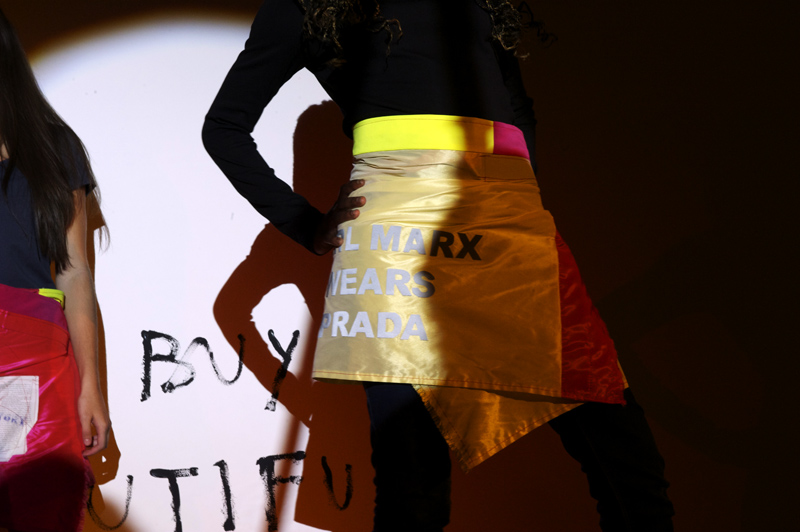
I produced my first piece of clothing for an exhibition at the Lichtenstein Museum of Fine Arts in 2012. They were made for the presentation of my Karl Marx jewelry collection which I originally called Karl Marx dressing UP but has been re-named Karl Marx wears Prada. The main part of these first works consisted of safety jackets and skirts that could be used as banners which communicate and protect.
Safety jackets are part of my daily protective wardrobe as a bicyclist. I adore its florescent color, the reflective stripes and the working class look, even in spite of some who talk down to me about wearing them. These quintessential working class outfits can have quite a confusing effect on people when worn off the street and working places, particularly to figures of authority. Adding CLASS STRUGGLE, SURPLUS VALUE, KARL MARX and hammer, sickle, a fist and so on renders them even more unusual. I transferred the safety jacket logic and transferred it onto skirts using reflective, black and white Velcro materials and reworked them as skirts, tops or flags. In Lichtenstein, these simple prêt-a-porter outfits were presented on stage with theatrical movements. At my White Columns exhibition in New York City I presented them as flags.
Joe Fresh /Benetto / Bangladesh, Rana Plaza Building Collapse, More than Eleven Hundred People died, 2013 - see here
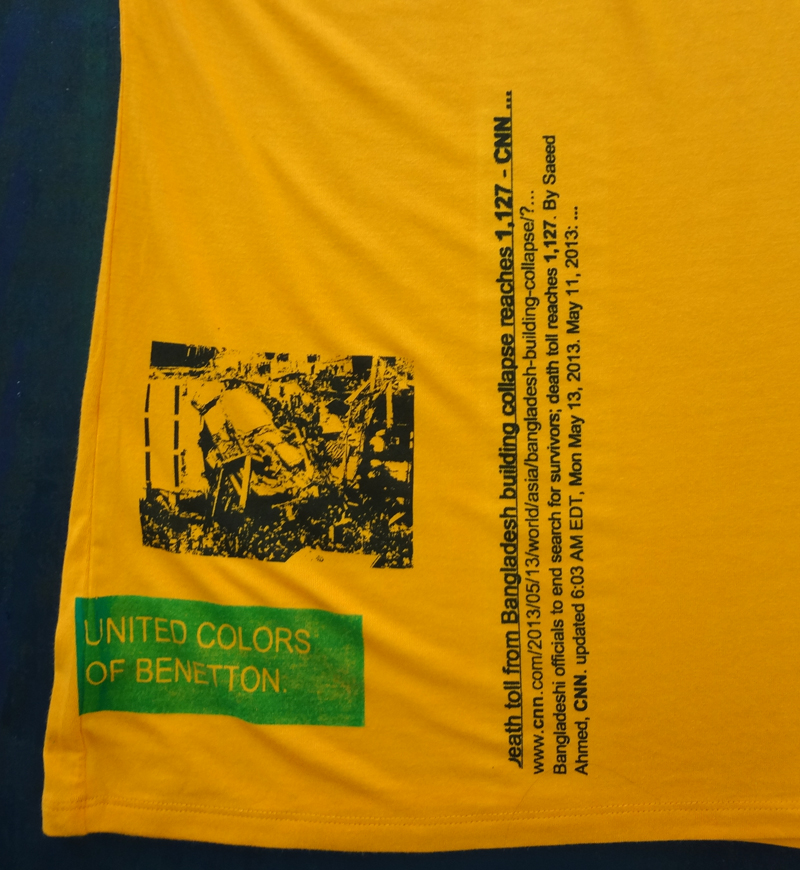
The Rana Plaza collapse in Bangladesh killed over 1100 people under incredibly fraudulent and totally preventable circumstances. Over the last few years this country has advanced to the cheapest and biggest sweat shop hotspot of the world for fast and disposable fashion. The Rana Plaza factory complex fullfills orders for major European and American labels. Hence I produced a series of pieces with the self-evident title Joe Fresh /Benetto / Bangladesh, Rana Plaza Building Collapse, More than Eleven Hundred People died, 2013. I silk screened news clippings such as Google searches or New York Times article fragments and label infos like “Made in Bangladesh,” as well as logos, materials, prizes and sizes onto precisely those garments made in this tragic garment district. I purchased these items at questionable shops and retail stores.
COMME des MARXISTS - see here
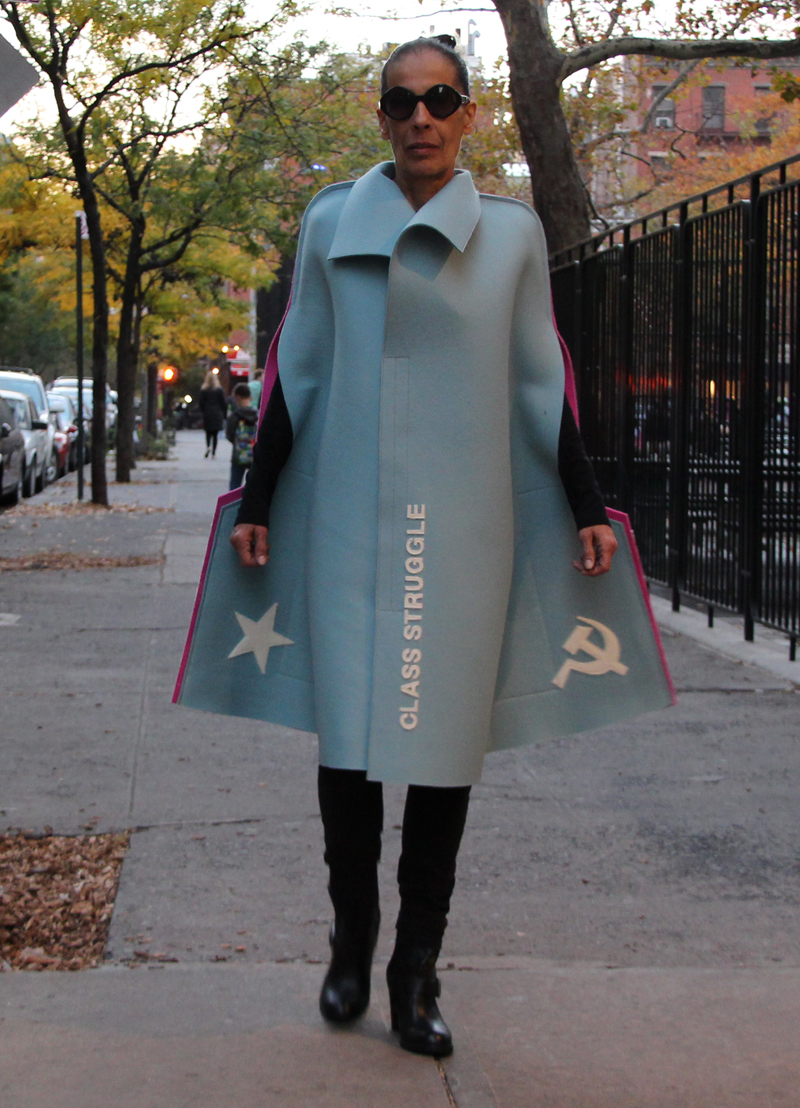
After a Comme des garçon store visit in New York, featuring a felt collection that borrowed from the constructivist designs of Stepanova the title COMME des MARXISTS flashed up in my head. I played with the logo and began drawings for an appropriate new collection under this title using felt as well. Like with Karl Marx Wears Prada I quickly emphasized the textual qualities these fashion surfaces offered and worked a summer through thousands and thousands of Euros of 100 % woolen felt and specialized labor. Not only did I revisit the Stepanova designs and used the star from the Japanese logo but soon became interested in proposing my own designs originating from fast hand sketches that were somehow tailored in reality playing extensively with the soviet symbols of stars, hammers and sickles as well as slogans like Class Struggle or Profit . Here too, contradictions became very quickly apparent – evident in the insanely expensive and exclusive materials and modes of manual skilled productions. Once departed on that road, more ideas and concepts were generated and took off as discussed below.
LOTTERY ECONOMICS - see here
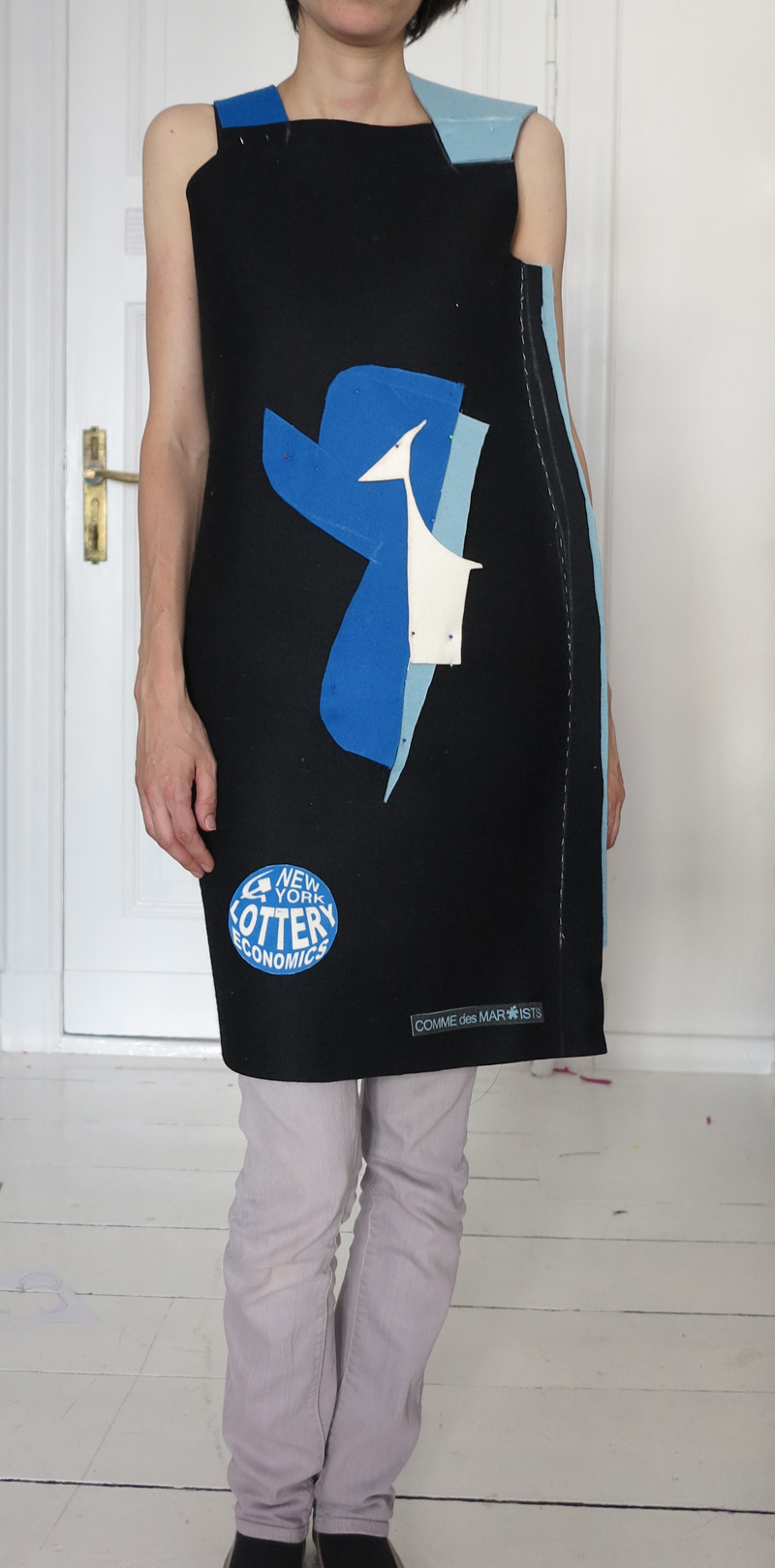
Before being confronted with Manhattan based child education I didn’t understand what a lottery principle personally meant. I looked at it only as an insanely disproportionate medium of exchange that collects usually money from the low income segment of people – at least those population I see at state lottery ticket venders - to benefit some ridiculously few lucky individuals. In our case, I have learned that the lottery principle consequently induces drastic social injustice by privileging the few educational institutions and leaving the rest in disarray. Since access to those few fine schools is not monetarily regulated or conducted through obvious nepotism the lottery serves as a fine instrument to reduce application numbers in the hundreds to the very few numbers a place can accept and handle logistically. It is also a fig leaf to re-institute the necessary selection processes by upgrading it to more sophisticated level where in most cases pre-k credit and behavioral indicators played as much a role as recommendations and zip codes. This is the reason why Marx 4 Kids also wore the LOTTERY ECONOMICS logo.
Saying all this, I want to point out that when the lottery is a real lottery the mathematic numbers are against winning and it is a secular believe system that has replaced real vertical mobility in real disadvantaged strata from where most single dollars stream upwards. But the lottery is now also more and more used as a pseudo-democratic equalizing instrument to hide large scale social, racial and economic injustices, while keeping the hope of the hopeless up. LOTTERY ECONOMICS not only plays with this systemic aspect of injustice but also alludes to the other end of the economic slide where people play the stock market and invest recklessly into any kind of assets no matter the consequences. There the equation usually is the higher the risk the bigger the return but as we have learned from the 2008 financial crisis that in the days of “too big to fail” losses get socialized and picked up by the state and gains stay individualized within corporate and private hands. Hence, the real lottery principal – for which I do not want to advocate - is once more twisted and perverted.
My LOTTERY ECONOMICS designs was the result of all my material leftovers which I first assessed with a small model for each silhouette. This explains why some of the dresses were showing signs and negative forms of other dresses and why the shapes are the way they are. I appreciated the randomness of this recycling process that tried to use sense of the mostly thick pure felt fabrics that cost about 200 dollars a square foot. Aleatoric circumstantial beauty out of recycled products is something our overstuffed world should appreciate more. Apart of the title each work had the first conceptual about 10 cm big mini-model added which helped me to make the final design added.
Marx 4 Kids - see here
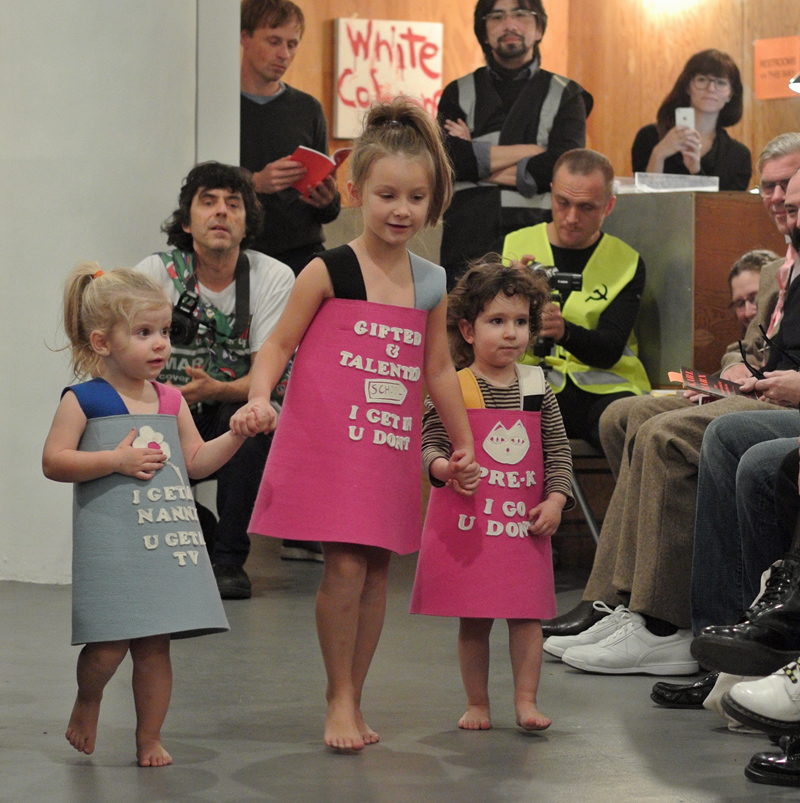
As mentioned in my project LOTTERY ECONOMICS, having kids taught me very quickly how society reproduces itself socially and economically. I myself personally grew up in a schooling environment that offered barely any options and those that existed were merit related. Today in New York City, decision-making in primary school admissions is akin to picking from a large menu with massive price differences and many choices with very narrow admissions policies. Without mentioning the details of this massive reproduction machine of injustice and worse – it is so heartbreaking when you see the best programs reserved for the biggest income group with whom you can never compete because it only caters to the 1 %! – my outfits for the small ones were covered with age adjusted sentences and some basic imagery saying things like “I get a TV, you get a nanny,” “ I get 3, you get 0,” or “I live here, you don’t” showing the Guggenheim as a good location. There are also those felt outfits that carry lines reminded us of these amazing fair tale heroes like fighters for and losers in the struggle for justice like “Marx (heart) Robin Hood,” or “Marx (heart) Cinderella.s”
SNOWDENMARX.GOV - see here
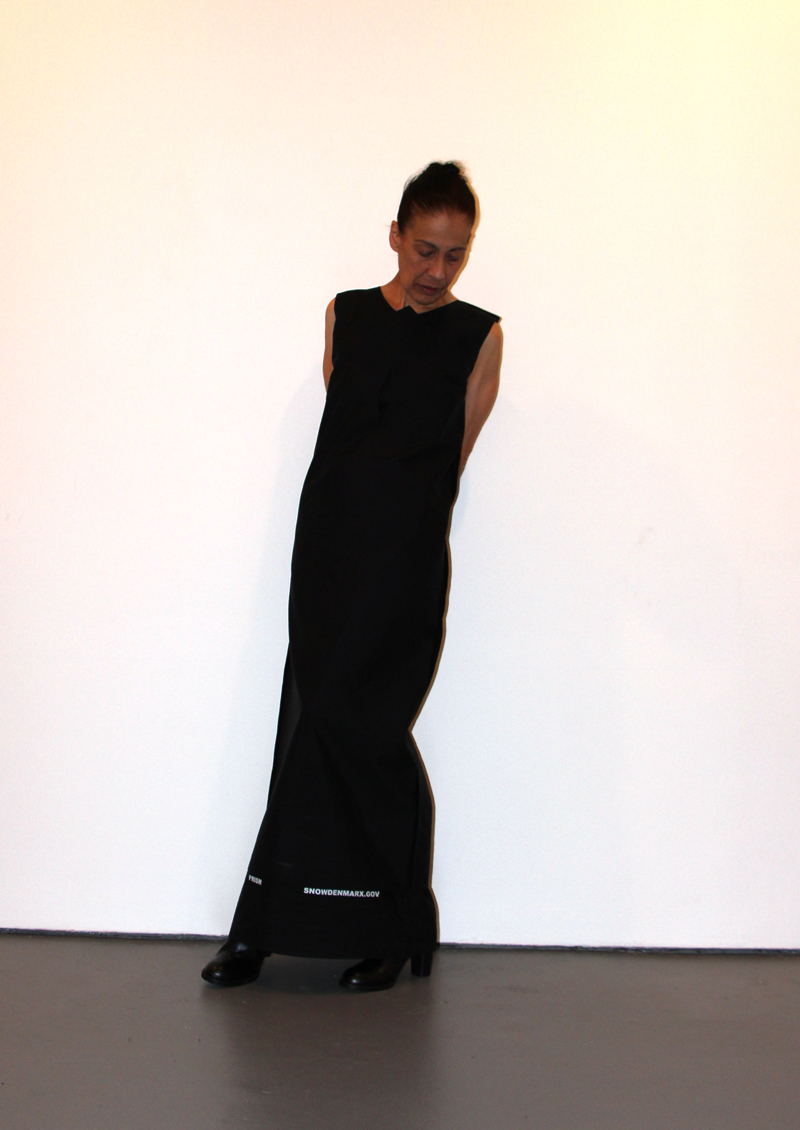
Edward Snowden’s revelation about the omni-presence of the N.S.A. in all of our communications was the second story that turned the political status quo up side down. Since Snowden, any promise or expectation for privacy in emails, info-clouds, electronic storage systems of any kind and in any remote verbal communication is futile and naïve. These unpreventable transparencies and monitoring conditions are not due to a few bad players or nations but omnipresent, permanent and intrinsic to the very technological grid that supports our lives. This inspired me to produce even two series.
SNOWDENMARX.GOVis a title of the first one and plays with a website I could never acquire since it ends with .gov. I conceived this series nearly the day of the American whistle blower’s first revelations which I accompanied like an old time reporter with a pencil and drawing. The first large scale spying program on regular people we learned of was called PRISM. For these 5 pieces, I oriented myself on the idea of a prism which I associate with the style and the period of art deco and the elegant times of pre-electronic letter writing, notes, whispers, black and white photos and love and intrigue based spying operations in grand hotels with names like Hotel Royal, Imperial, Grand Hotel, Ritz, Plaza, Waldorf Astoria, and so on. I first made a drawing of a black lineless silhouette of two dresses in one and purchased the finest Japanese cotton I could find in New York City. The openings in the front and the back and the double layers of the dress reminded me of all those emigrant stories I listened to of people who had to escape Nazi occupation and were carrying money, documents and jewelry sewn into coats and garments. The anachronism and the skinny verticality constituted a wanted contrast to the technological status quo of today as well as one to the more sculptural and bulky works with felt.
MARX SNOWDEN SECURITY - see here
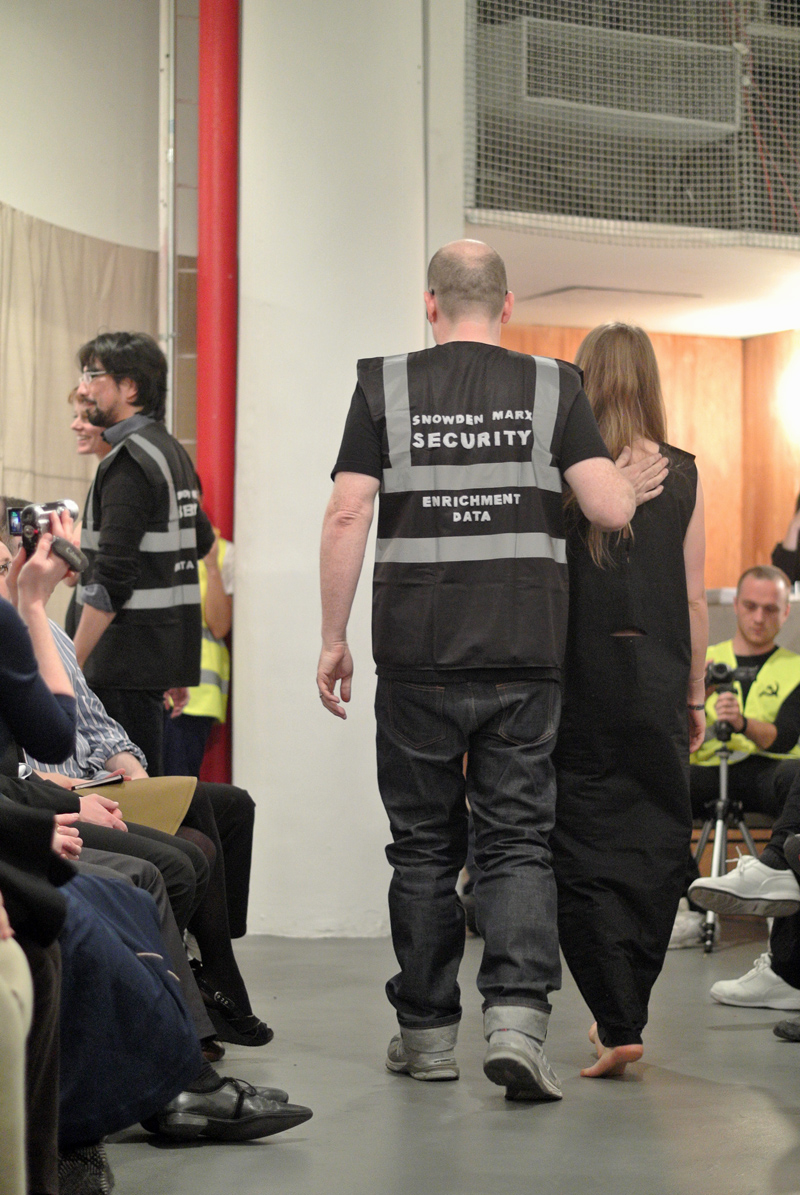
The N.S.A. uses even computer programs to generate big amounts of code words that are usually written together and appear in capital letters. I used some of these highly inspiring and significant terms like MAINWAY – the total amount of all captured gross data by the USA – or TEMPORA, the same secret dragnet operation but carried out by the British – and applied them onto the relatively hard to find and seldom used black safety jackets with reflective stripes worn by security firm laborers. This series is simply called MARX SNOWDEN SECURITY. Apart of N.S.A. code words that thanks to Edward Snowden were leaked to the media, I also included the names of the US and British information gathering agencies, the N.S.A and the GCHQ, the British equivalent and collaborator of the American intelligence agency.
KARL MARX VISIST DAVID ZWIRNER ON 20TH STERET, BLINKY PALERMO, LATE WORKS …- see here
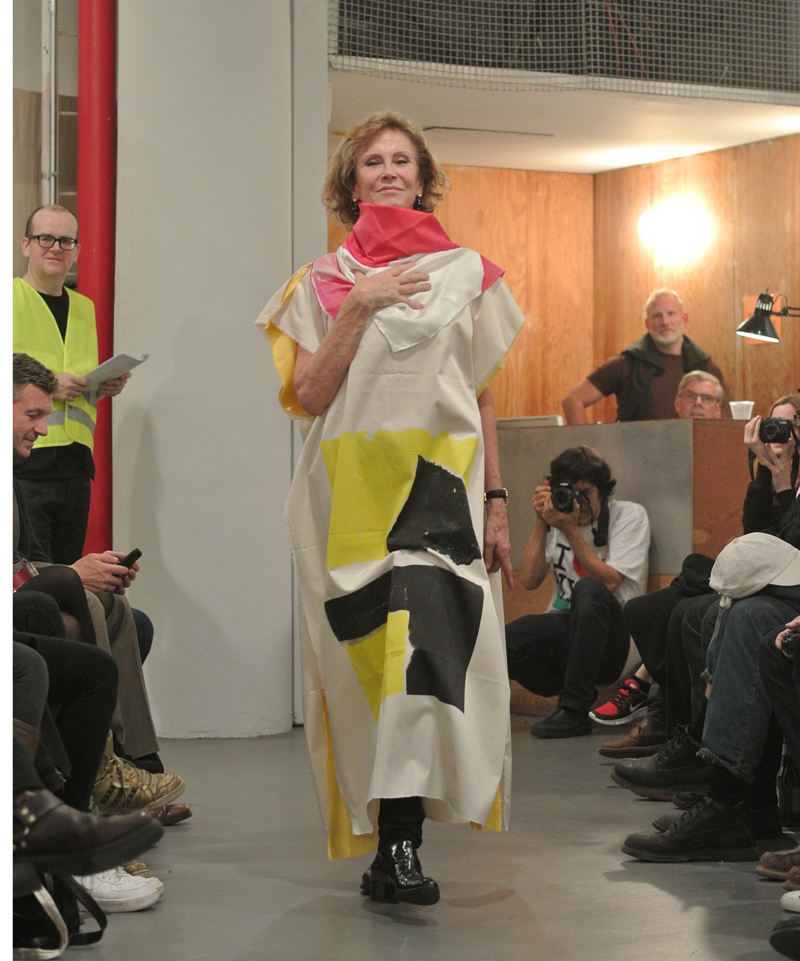
It is a simplistic common place that Marx is associated with the economically lower segments of our society though his analysis concerns all strata of society. Given the fact that art really knows no limits, it is also an economic platform catering to the richest and most privileged segments of our society and its fairytale end of collecting and art consumption. In the recent decade or so a new class of art dealership has established itself very visibly with a multitude of grandiose large and impressive spaces that spread out over the richest global capitals in USA, Europe and Asia. These new international enterprises are primarily showcasing the most expensive art of living artists with global name recognition and spectacular pricing for the really, really rich to compete for. David Zwirner is part of this mega gallery complex with an additional space in London. When I visited his newly opened stunningly beautiful second or third space in New York that could rival the looks and size of a museum on 20th street, I saw Late Works by Blinky Palermo and Early works by Richard Serra that inspired me for some fashion work with this title.
For my works on Palermo, a German painter who died very young in the 1970s and left only a small body of works, I silk screened some of the color combinations and designs I saw at the gallery on Japanese fine cotton and silk. Some of the fabrics were reworked as simple drapery to give the impression of canvases. Playing with the original title of Palermo’s artworks the works received the titles KARL MARX VISIST DAVID ZWIRNER ON 20TH STERET, BLINKY PALERMO, LATE WORKS, The enigma of Karl, 1976/2013; or …. Who knows the beginning of the revolution and who knows the end, 1976/2013. KARL MARX VISIST DAVID ZWIRNER ON 20TH STERET, BLINKY PALERMO, LATE WORKS, Manhattan Marxism, 1976/2013 draws on the painting Manhattan and is made into 70s style pants and mini skirts which revealed that proximity of the painter’s pallet to the colors of his time. The silk screen printing of the silk foulards were taken from a drawing series “Untitled (for Barbette), 1976 and was named …Untitled, (For Rosa Luxenburg), 1976 / 2013, the German revolutionary who was assassinated in Berlin in 1919. With the exception of the foulards, each individual work had the rather long titles and the orignal art work printed on the pieces as if a commercial logo.
KARL MARX VISISTS DAVID ZWIRNER ON 20TH STREET, RICHARD SERRA EARLY WORKS - see here
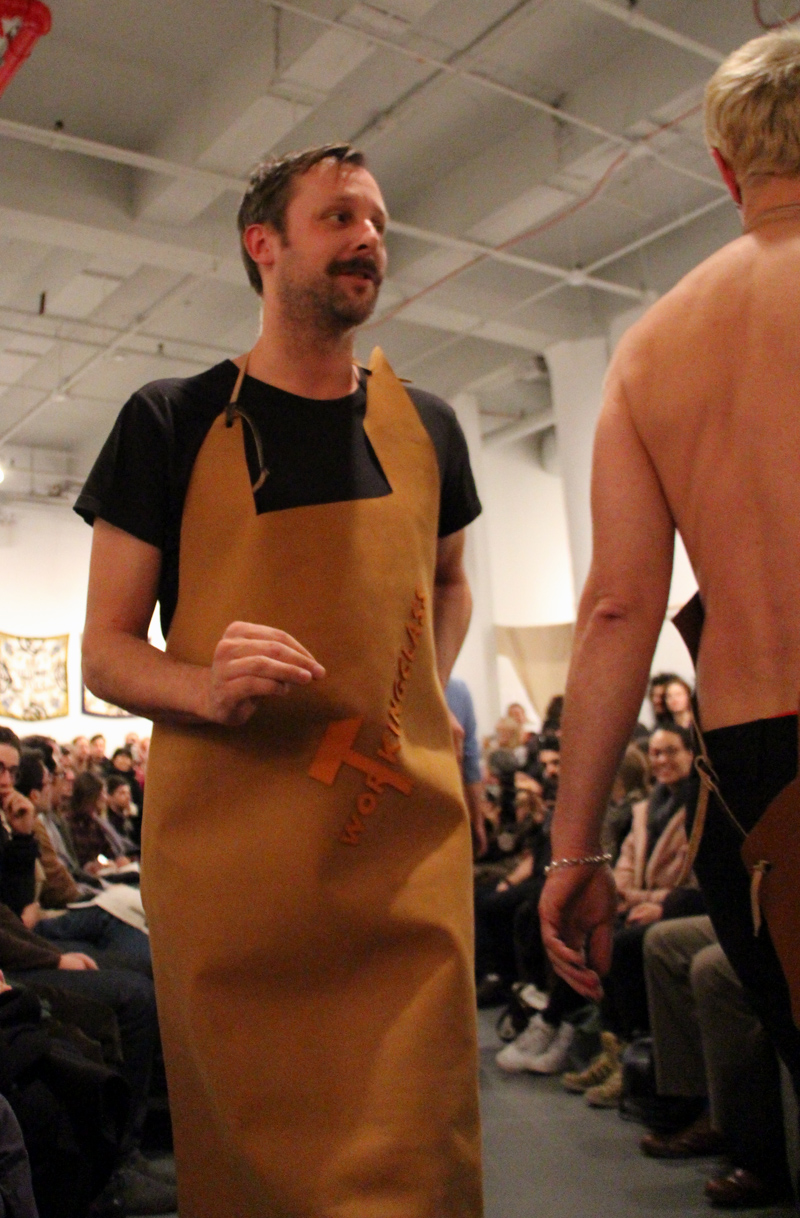
This body of works functions just like the works of Palermo with adapted titles and work features. The Serra piece Template, 1967 looking like an upside town leather apron was hence turned into a simple leather apron to be worn with the subsequent title KARL MARX VISISTS DAVID ZWIRNER ON 20TH STREET, RICHARD SERRA EARLY WORKS, Template for a Revolution, 1967/2013. Serra’s To Lift, 1967 consisting of vulcanized rubber from the same Zwirner show was copied as well into a similar looking rubber piece to be carried as something wearable.
Given the values of these artworks I referred to and the fact that they were directly related to such a high profile gallery I asked artist friends to model the Richard Serra Early Work pieces. I was able to engage next to others artists David Coleman, Peter Fend, Leigh Ledare, Wolfgang Maier and Ingo Niermann. For presenting the Blinky Palermo Late Work garments and foulards I asked ladies from the art world who might have been able to meet Palermo before he passed away at age 33 due to his drug consumption. Thea Westreich, Jacqueline Burckhardt, Bice Curiger, Shelly Arons, Linda Yablonsky and Janice Guy modeled who all know a lot about the world of art and its inner workings.
MARX SUPERSTRUCTURE - see here
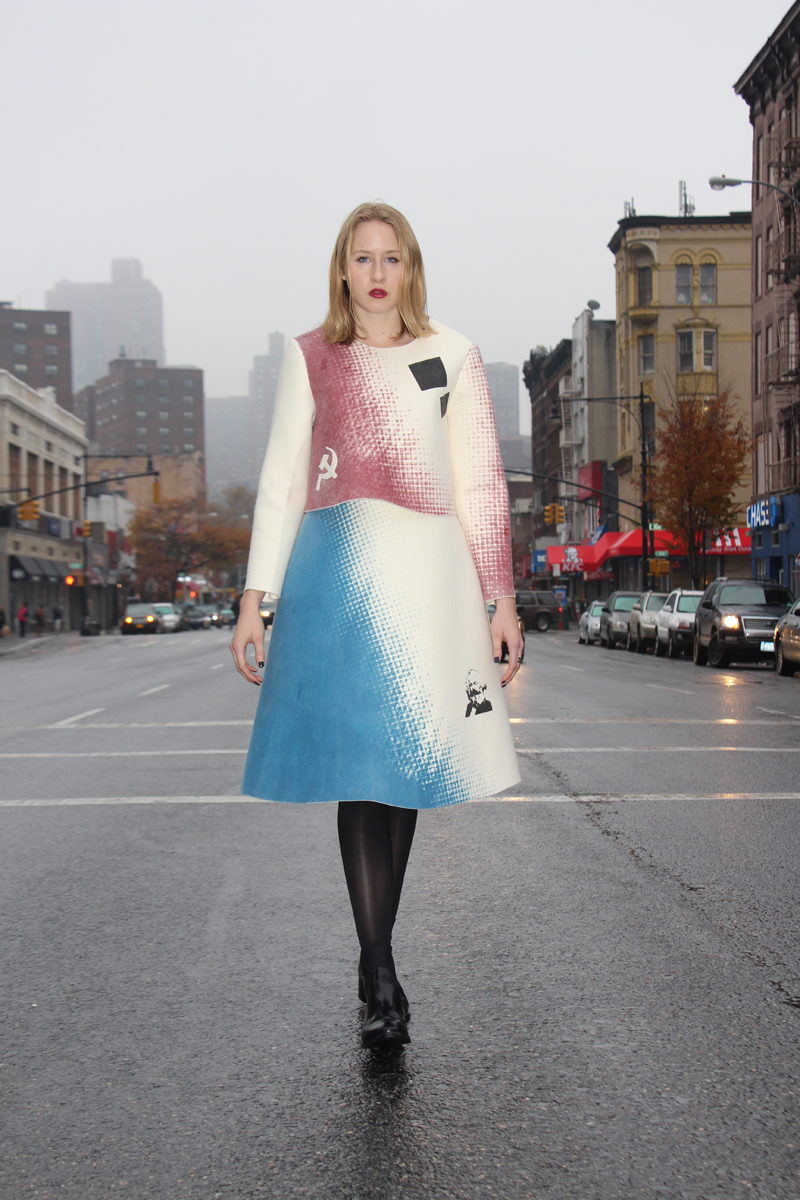
The dresses for this series are inspired by Kazimir Malevich who is known not so much for his beautiful figurative paintings of peasants and workers which I served as blue prints for my styling choices but for his famous abstract paintings he called SUPREMATISM. Suprematism expressed abstract, transcendental and supreme longings and embraces only a “non-objective world”. It is supposed to be the “primacy of pure feeling” and was best met with his famous 1915 Black Square painting and his White on White painting made a few years later. Black Square is considered one of the most important painting icons of the twentieth century. Needless to say, this radicalism mirrors some of the political avant-garde transformed Russia as well in an “non-objective world” ruled by the “primacy of pure feelings” of its supreme leaders including Stalin, who had people killed at his own paranoiac feelings and intuitions and pushed millions into starvation and death due to new radical ideologies discarding given economic and agrarian logics.
Karl Marx calls superstructure everything that hovers above the totality of his so-called economic base as encountered at any given developmental moment constituting the economic structure and all its means of production. The superstructure above that is hence constituted by legal, state, cultural and religious realms associated with the state apparatus producing their own social reality. Art is part of this superstructure formation and open to many interesting interactions and contradictions also visible in the appropriation of Malevitch’s paintings of Russian peasants and workers, i.e. the protagonists of the base. Just like in the case of my Karl Marx visits David Zwirner on 20th Street series, my work titles are based on the titles of the original painting I drew from but get reworked. Suprematist Painting: Aeroplane Flying, 1915 is turned into SUPERSTRUCTURE, Flying Hammer & Sickle, 1859 / 1915 / 2013 mentioning also the painting’s dating, when I made it and the years of when Marx first developed his base-superstructure model in his preface to his A Contribution to the Critique of Political Economy, 1859.
Marx 99 cents - see here
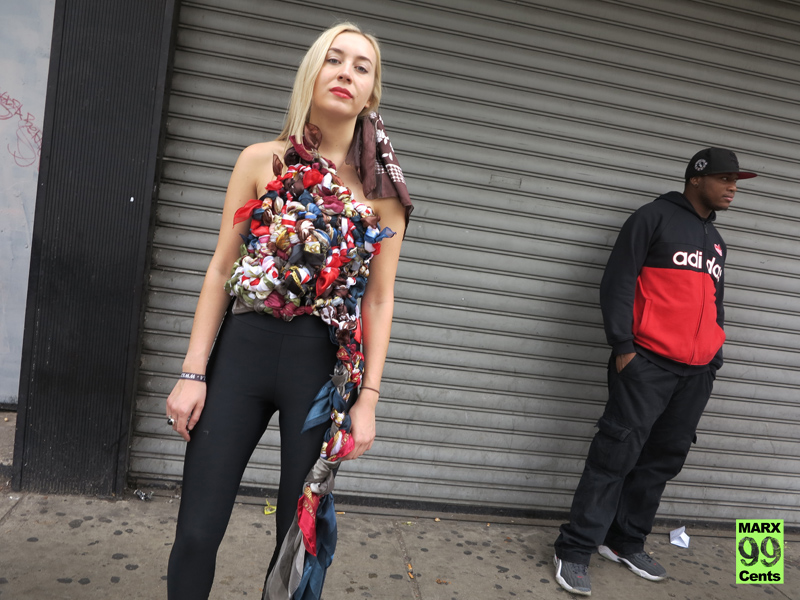
For this series, I exclusively used foulards that were sold at 99 cents in Spanish Harlem and created some loose garments that could be worn as fashion items. The loosely hanging or tightly quilted fake silk scarves with colorful, fancy looking patterns took on quite some impressive forms and gained approving comments from ordinary street folks during our time parading and photographing them in the avenue where I purchased them out of shipping boxes. At the White Columns show, they were not included in the runway presentation but the scarves were quilted into the big and significant number 99. This number mirrored not only the typical price for the cheapest somehow useful stuff to purchase but also echoes the Occupy Wall Street movement that spoke out for the 99% and against the 1%.
HERMES MARX - see here
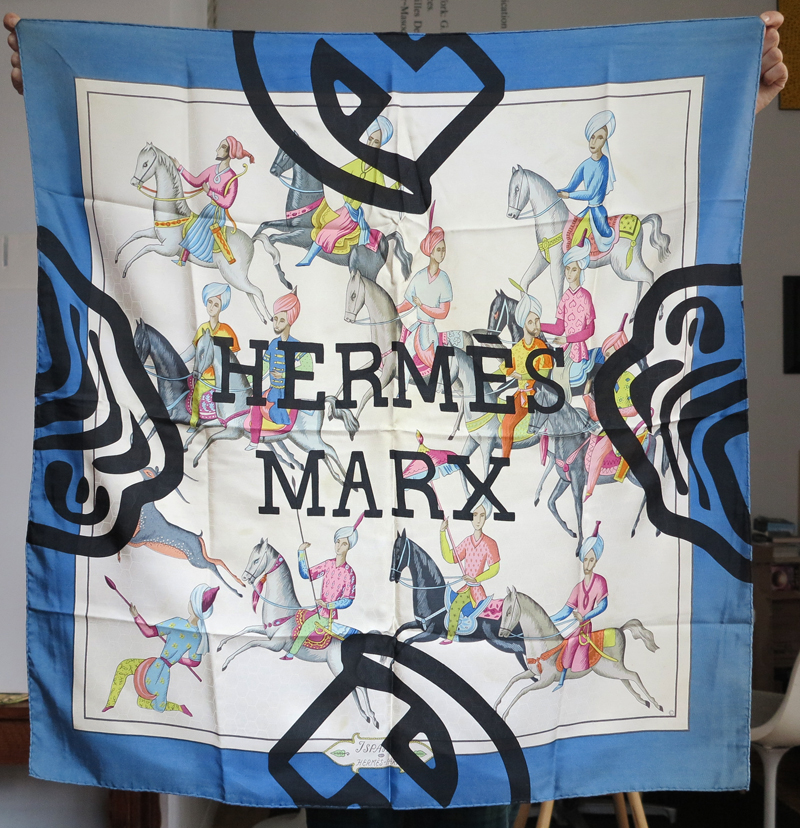
The synthetic silk scarves for 99 cents would not be even worn by people who belong to the economic group of the wealthiest 10 % though they approve of Hermes whose 90x90 cm foulards resemble real estate square foot prices. In the aftermath of the 2008 financial crisis this wealthy group got off to a much better start than those at the opposite end of the financial spectrum. Many people so far have never gotten out of the crisis to this day, but luxury consumption has widely expanded and gained in the recent years. Hermes is most certainly a high end retailer where getting the most desired scarves is not always easy. Hermes products of the best designs are sold out quickly if they ever even make it to the special few boutiques in a few metropolises where they are sold without ever encountering a “for sale” sign or making it to a discounter. The limited edition bags priced at many thousands of dollars are rarely sold to just anyone walking in with the money but are even reserved for the elected few who have connections or belong to the who’s who of media and glamour. But you can always make it on a waiting list and will be informed when new products arrive at the shop.
Hermes is particular in many ways, including the fact that it stays a family business and rejects big capital. They produce everything they need in the traditional way and oversee production in France and overseas. Given the low volume, the high quality of the ware and the complicated, traditional not fully automated way of producing, the pricing seems more justifiable than it appears and I am myself fascinated and intrigued by their colors and their exotic and orientalizing designs. Hermes draws most of its designs from France’s colonial past and glorifies it, something that gives it the false aura of having produced phantasmagoric designs already established since the early 19th century. To my surprise, I found out that the foulard line only was introduced in 1937, i.e. the real beginning of the end of colonial France which was accelerated by the drama of WWII. In that sense one could even ask whether the desire for visualizing the French empire was anticipated by Hermes at the very moment, when France itself came under attack by the short lived brutal Nazi Reich/empire efforts that brought the dark reality of epic catastrophe from the colonial territories to the heart of Europe effecting anything and anybody around the world.
The history and revolution making intellectual who understood the connection between the fight over colonial hegemonies and markets in the tradition of Karl Marx was Lenin who drew in 1916 a clear connection between rivaling colonial powers and nationalism in his master piece of writing on the subject, entitled “Imperialism, the Highest Stage of Capitalism.” Hence, the connection between HERMES and MARX is therefore not just one of funky contradictions playing on the obvious that working class people were not covering their heads and necks with the silks of this French manufacturer. Hermes scarves made it very early onto the shoulders of Queen Elizabeth II as seen on a portrait of a British postage stamp from the year 1956. For my works, I departed from the enunciative name-city connection of the brand, Hermes Paris and silk screened my variation onto the very Hermes items itself elevating them to another kind of art, i.e. contemporary art, hence destroying the rather expensive user item as such.
The design of my printing was a monochrome abstraction of a hammer and sickle as well as the words HERMES MARX suggesting that PARIS, standing for ubiquitous beauty and style is now replaced by MARX, standing for endless questions and demands about social justice and economic workings. Even in German universities, students do not necessarily know anymore that the combination of hammer and sickle was the main symbol of communism. Apart of printing directly onto the original foulards, I also created some new scarf designs printing on white silk thus alluding to the abstract foulards made by Josef Albers for Hermes in the 1950s, the high days of the cold war.
Accessorizing Karl Marx - see here
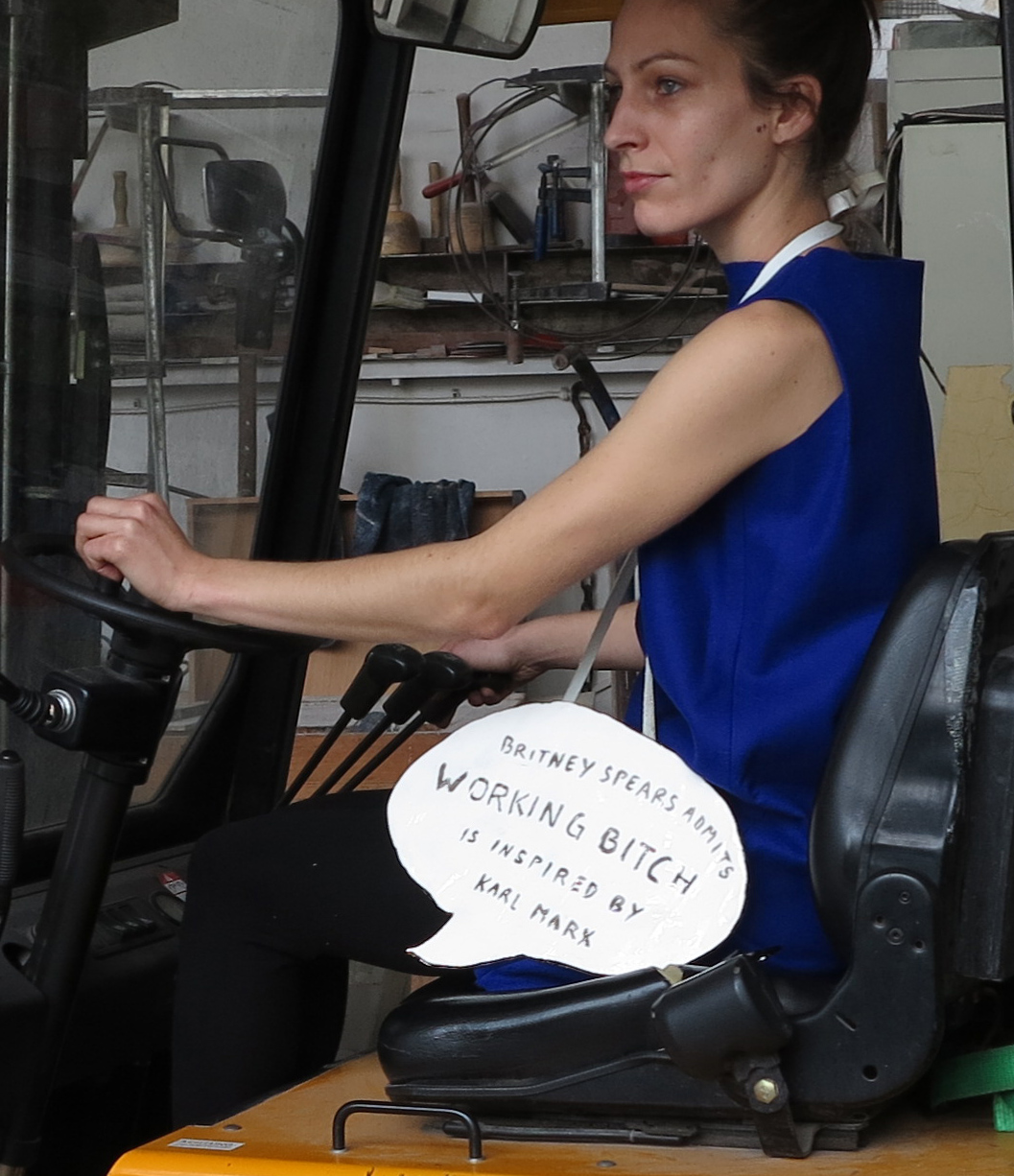
The first Karl Marx related jewelry pieces I made years ago and actually triggered this entire fashion project. When invited to present these few pieces I had, I took the occasion and produced some garments for the presentation of them as mentioned in the KARL MARX WEAR PRADA section. As nearly with all my works, the jewelry, made in different materials, served just as yet another surface to write on and play with contexts and references. I become very fond of speech bubbles formats that allows me to pick up trivia like “Britney Spears admits Working Bitch is inspired by Karl Marx” “woww … DOW Plummets over 1200 points” or “I hate Karl Marx.” As a byproduct from my first tailoring experience, I reworked the idea of the necktie and called it Rope Around Your Neck. For the NY presentation of COMME des MARXISTS I made more works in porcelain as well as in silicon which I was even forming myself into shape. Silicon came in very handy because I could color it myself and have it cut by a computer controlled 3 D cutting machine which made perfect sense for the works labeled MARX SEX WORK. Finally, I added a series of necklesses that were made of felt and dealt with Marx quotes entitled Karl Marx Said …
Karl Marx Said … - see here
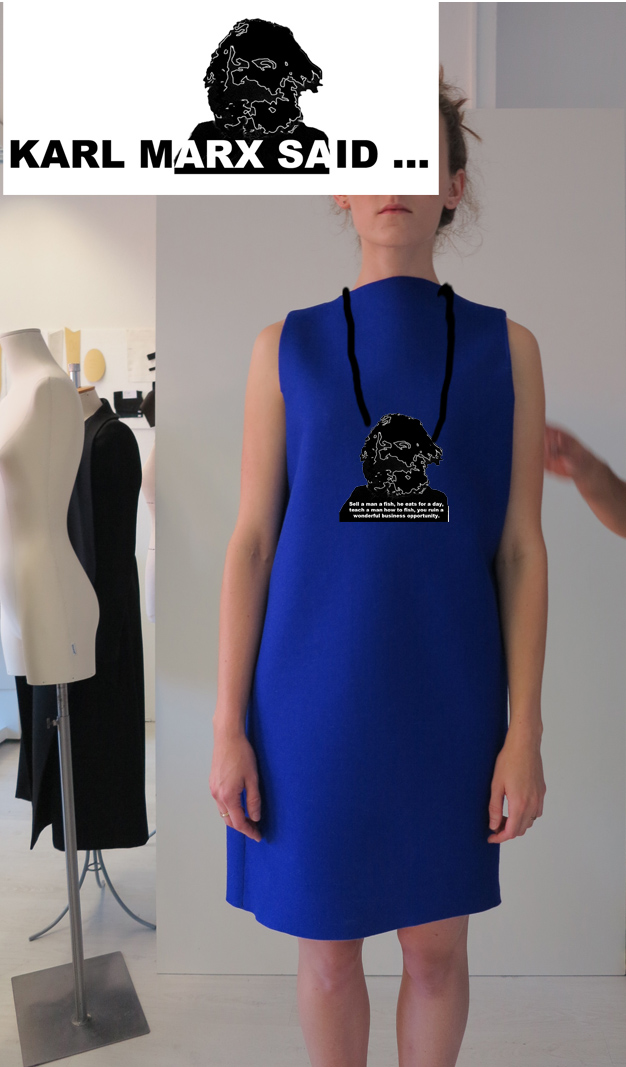
This title was not only used for Marx quotations silk screened on felt but also for a series of monochrome dresses in three different colors meant to handle these accessories. The final silhouettes were made only two weeks before the fashion show with the help of a professional fashion designer, Cem Cako according to my drawings, using the latest of a relatively thin 100 % felt fabric that had not even been officially released by the company. I did really fall in love with all these fabrics, the production process and the excitement to get some ideas translated from some simple scratch drawings to a tangible product and couldn’t refrain myself from producing even though it pushed me into deep debt because of the high costs of the professional process. There were moments I had up to 20 people working on something and not everybody did so pro bono. The list of helpers who did it simply because I could convince them with my ideas is very long since I myself am very helpless when it comes to manual work. As most of my works, this series too was marked by some label attached to it somehow.
Karl Marx Speaks Chinese - see here
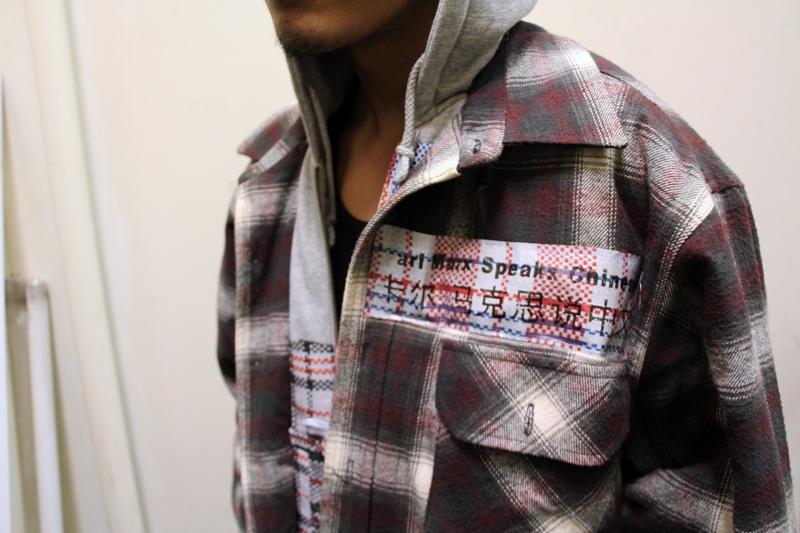
The design of these works is based on the cheapest kind of bad quality bags but glamorous looks that can be seen around the world used by those who have lots of stuff to carry but little means to do so. They can be frequently seen with street vendors, homeless people, refugees or simply students with limited budgets. According to the origin I refer to them as “Chinese bags” but the Germans call them “Turk bags” because they are often sold in Turkish shops. I could imagine that there are many ways to refer to these bags depending on where they are sold. I myself have quite some affinity to these bags since I have used them for various moving of stuff and art works. Most of my early material relationships with these bags has been for functional use in subways, trains, planes, and cars. I still use them for many reasons, including my fashion project. In fact most of my COMME des MARXISTS works are stored in them.
The quality of these bags that come in two sizes has not changed and can be qualified as remarkably strong plastic fabrics and very poor zippers that don’t last if they even work in the first place. I have realized that over time, the bag design has evolved from the typical blue, white and red stripes into more sophisticated tartan patterned ones and a more colorful next generation is already widely in use in China but has not yet reached New York discount shops and street vendors as of early 2014. The use of the three color plaid seemed to not only be convenient for the production of these cheap bags that might use recycled plastics but also cater to very popular middle class tastes thanks to the phenomenal success of Burberry’s fashion which is selling plaid designs only.
In the US, there exists a traditional working class jacket which is made of wool and based on checkered-cloth patterns. Without knowing the exact history I assume it traveled with British immigrants and subsequently became Americanized and made into a very practical working class outfit. Like in GB with Burberry, Ralph Lauren picked up on this US style and used them quite successfully in his middle and upper middle class plaids designs. When the original tartans stood for regions, clans and families, the London fashion house sells it world wide as an indistinct meaningless design that communicates nothing but its luxury brand. The biggest success of Burberry is in nouveau rich China which also copies it in so many ways that it gets redistributed again as cheap fake mass products throughout the world. Interestingly enough, Ralph Lauren redesigns the working class jackets and sometimes add fake Americana labels next to its own labeling.
For my Karl Marx Speaks Chinese I purchased these checkered jackets from second hand shops including the Salvation Army and integrated my Chinese plastic fabrics so it would create a new organic design. The title of this series was silk-screened in English and Chinese on the plastic material and served as a logo added somewhere on the jackets. In some instances the plastic fabric extended the cut of a jacket and turned it into a coat. Ironically, this fall, Celine, a very expensive high end French fashion house, picked as well up on this ubiquitous bag design and made some beautiful runway line out of it albeit without any of my conceptual context framework which could make Celine look cynical. For a photo shooting I was able to chat up a lady from a gallery opening dressed in such couture and have her pose next to one of my designs which really enriched the meaning of my attempts.
There is only one Karl / FELT belongs to everybody™ - see here
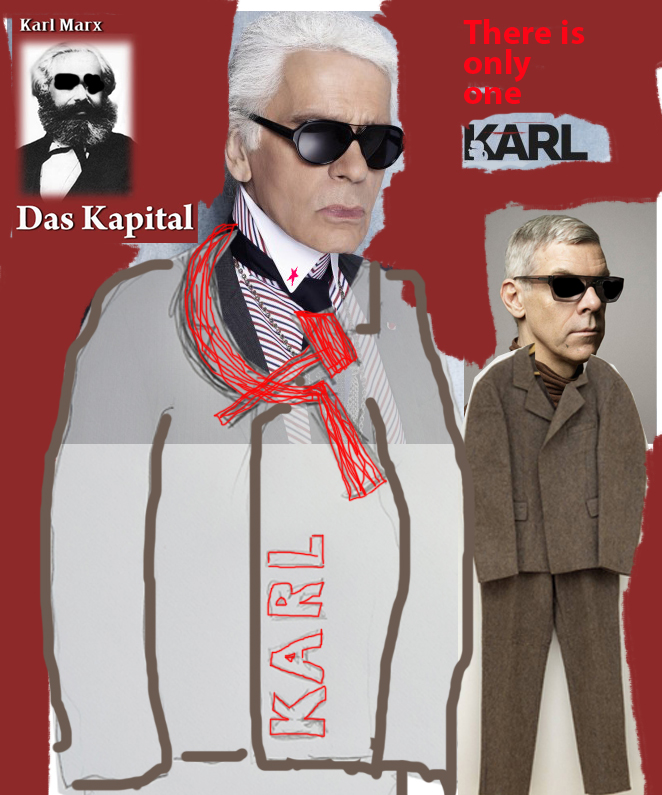
Karl Holmsqvist is a Berlin based poet, artist and a friend of mine as well as a beloved voice in the art world. During a dinner in Berlin, I suddenly realized that I had three Karls on my mind: Karl Marx, Karl Lagerfeld and Karl sitting next to me on the table. The claim that there is only one Karl inspired me that very night to a set of works that brought yet another German legion on my mind: Joseph Beuys and his felt suit. In Germany, everybody in the art world shares the feeling, there is only Beuys who was entitled to use felt for his art works. Therefore, I wanted to dress Karl in a Beuys suit and label the outfit There is only one Karl. In a quasi-socialist gesture I added as a second label FELT belongs to everybody™ trying to break the proprietary intellectual aspect of this quintessential German material since the majority of high quality felt is still produced there.
Beuys’s iconic felt suit features a special label indicat even twice which edition out of 100, the year 1970 as well the gallery René Block, Berlin which produced it. I took the same format up, made it unique and mentioned Haunted Houses Projects, Harlem, New York as fictional producer, referring to an institution of mine which exists only as idea but reflects my location and other activities of mine in Spanish Harlem. To lighten up the iconic seriousness of the German’s original outfit that can only be recognized as such when it hangs on a hanger on a wall, I opted also for a summer version with short legs. On the left front of the jackets the letters KARL were added. The way, Beuys’s felt suit is unique, Lagerfeld is known for his eccentric way of wearing specially cut shirts he only wears himself featuring very high collars to cover up all the bodily stuff that finally might hinder his very successful bit for immortality. My synthetic silk red necktie got freely interpreted, embellished with a small hammer & sickle and renamed after what any tie actually is: Rope around your neck.
The main condition for this set of works was that Karl Holmsqvist would come to New York and present it himself from Berlin. Given the title, There is only one Karl, I realized I had to have at least a second poet for the show. Finally, I paired Holsqvist with the “Moma’s poet laureat” Kenneth Goldsmith, the poet Robert Fitterman, winner of the 2000 “New American poetry award” and the writer and art critic Peter Duhon. In four different outfits, including two long pants and two short ones, we presented all poets several times during each of the two nights with all poets reading short texts or poems of their own choice. The irony has it, Kenneth Goldsmith customarily dresses in COMME des GARÇON suits, coats and shirts fancying a contemporary form of dandyism which gave my There is only one Karl styling yet another spin since the overall context for my endeavor is COMME des MARXISTS. Since I could only afford the production of two jackets, the second suit which hung as a reference piece during the entire evening performance would be taken down for the additional performer and then hung up again thereafter.
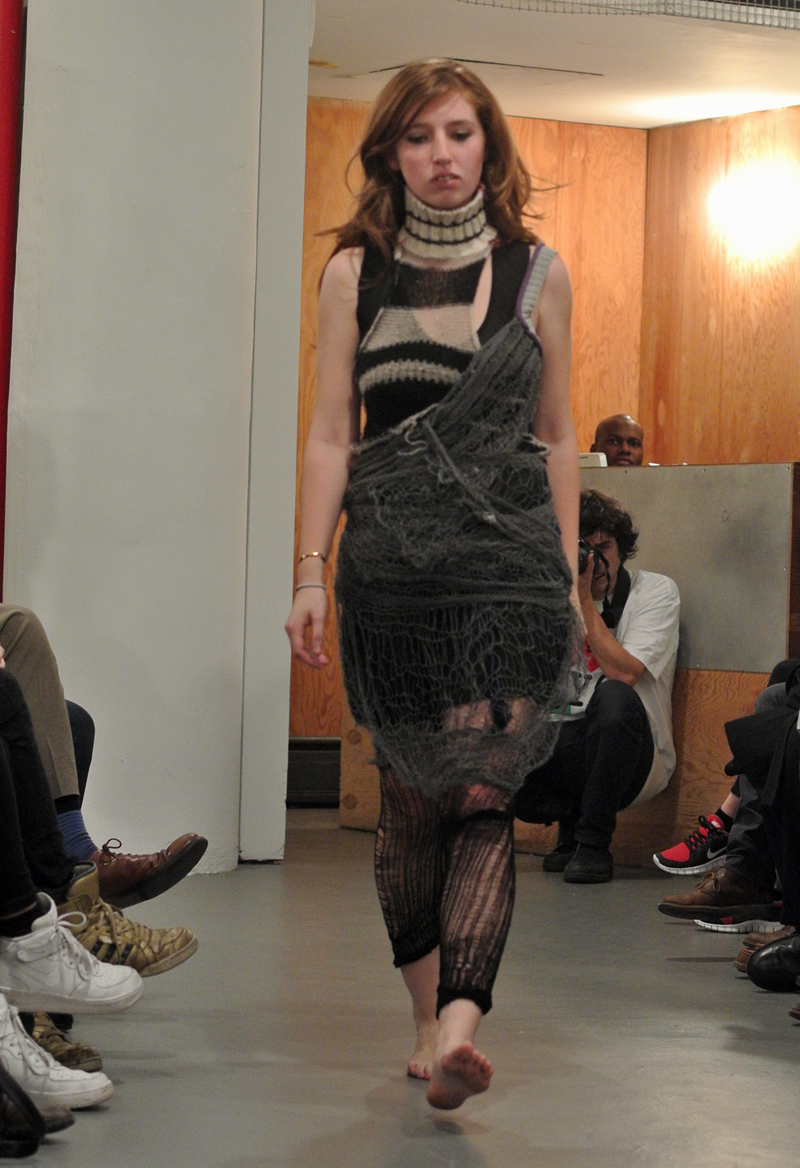
In 1848, Friedich Engels, the son of a mill owner published the book “The Condition of the Working Class in England” which is one of the most comprehensive first hand accounts of the terrible inhuman misery these first industrial workers endured for survival. The text of Engels who fell in love with one of the Irish workers with whom he lived all his life resonated widely throughout Europe and alarmed people and law makers. Some paragraphs were dedicated to matters of clothing. In "cheap shops" the worker ”finds bad, so-called "Devil's dust" cloth, manufactured for sale and not for use, and liable to tear or grow threadbare in a fortnight” (Engels). It was not Engels, but the deprived workers who called them “Lumpen,” their rags “devil’s dust.” I took up this inspiring title and played with various knitwear and other recycled fabrics towards an esthetic of the Lumpenproletariat.
MARX COVER UP / OPIUM -- see here
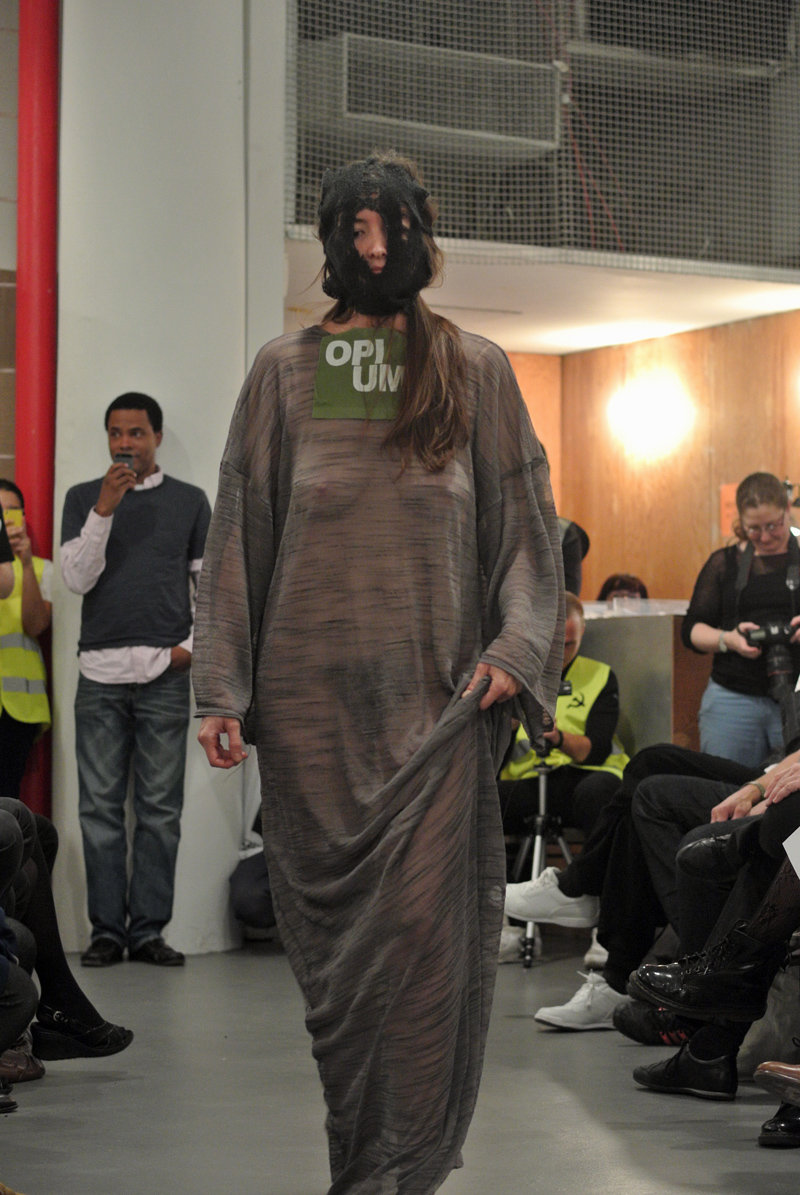
Both elements of this double title as well as the garments and masks that constitute this section are chosen to allude to Karl Marx’s most famous sentence: “Religion is the opium of the people.” In spite of many decades of secularization in the 20th century, right now we are observing religion again as a main reason over which battles and wars are fought, and people and property are killed and ruined respectively. We see even in advanced Western societies more and more attire that adheres to rather conservative features which cover up religious traditions. Interested always in contradictions and dialectical propositions, I opted for a maximum of garment transparency covering all of the body and a facial cover up guaranteed by a black mask. In order to boost the title and reintroduce some non-transparency on the body I silk screened OPIUM and MARX COVER UP on over dimensional pieces of woven fabrics that were hang in front and in back of the very loosely machine stitched fabric.
MARX MIDDLE CLASS SQUEEZE -- see here
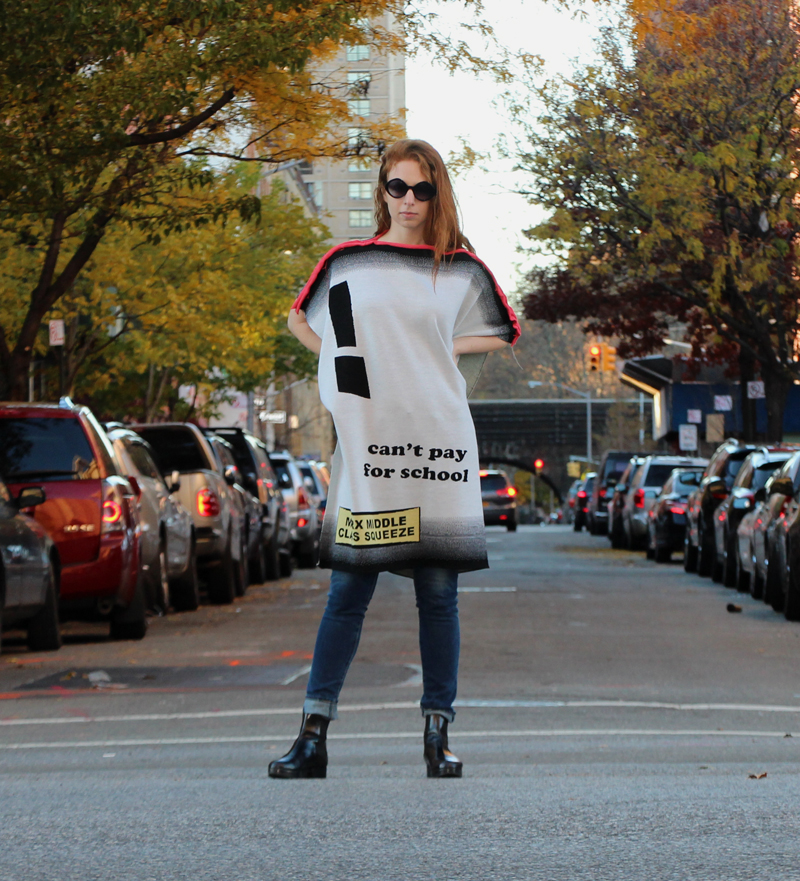
This series addresses those economic realities which the rank and file American is concerned with: access to schools, jobs, health care and retirement. In the USA, given the tremendous income disparity, even some of the various middle classes are about to lose out on all those guarantees of the past which are now quickly becoming a luxury. Nothing is anymore a merit based level playing field and socio-economic and racial distortions are reinforced through precisely these realms, i.e. to have access to good schools or not, to have health care insurance or not etc. I had exact computer controlled machine knitting and could translate my designs into very simple easy to wear outfits featuring comic book kind of speech bubbles with sentences like “Can’t pay for school” or “Just lost my job.” They were supported by the over-dimensional logo MARX MIDDLE CLASS SQUEEZE and could also include a fist I also used in the logo of HERMES MARX.
Some of the poncho like cuts fit all sizes including possible obese members of our society which brings us back to questions of education and health care. Ironically enough, the production of these items belongs to some of my most expensive things that were only made possible with the generous support of STOLL AMERICA’s New York based super advanced knitting computers which are nearly impossible to be paid for outside a limited sample production for the high end fashion industry. Even the necessary high quality merino wool was in the end very expensive and gives a hint to the economic realities of clothing in earlier times when people were only in possession of very few dressing items over the time of a life span due to the hight costs in comparison to food, income and housing.
MARX TOXIC -- see here
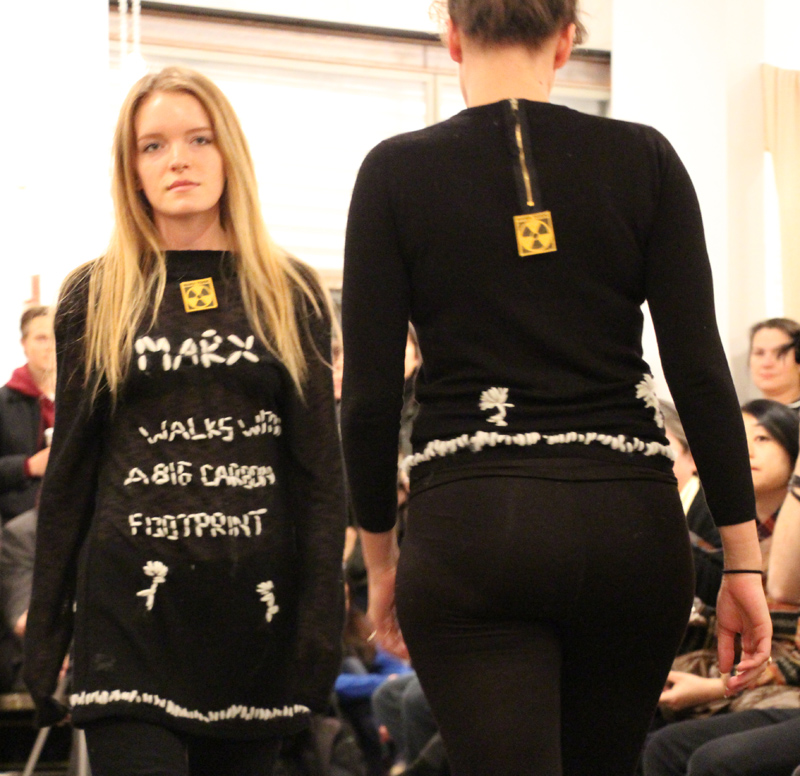
Today, producing anything equals some direct or indirect pollution of our environment and the depletion of our resources even if in most cases we do not witness it anymore. We do not even have to pay the real price for it directly. The fashion industry is a terrible culprit in this and globalization accelerated this trend circulating pollution, toxicity, waste and trash world wide. Fast fashion reduced many items to de facto one way excitements that are worn only a few times before they are written off or are trashed right away. Sometimes, I find myself buying stuff and not even wearing it a single time. Very few people are fully aware how bad the carbon foot print of fashion is given the synthetic dimension of the materials involved, the coloring, the complicated chain of production, the world wide distribution and transportation. We should also not forget the PR campaigns that are running on enormous computer and communication power grids that bombard people with advertisements and trends.
SEX WORK -- see here
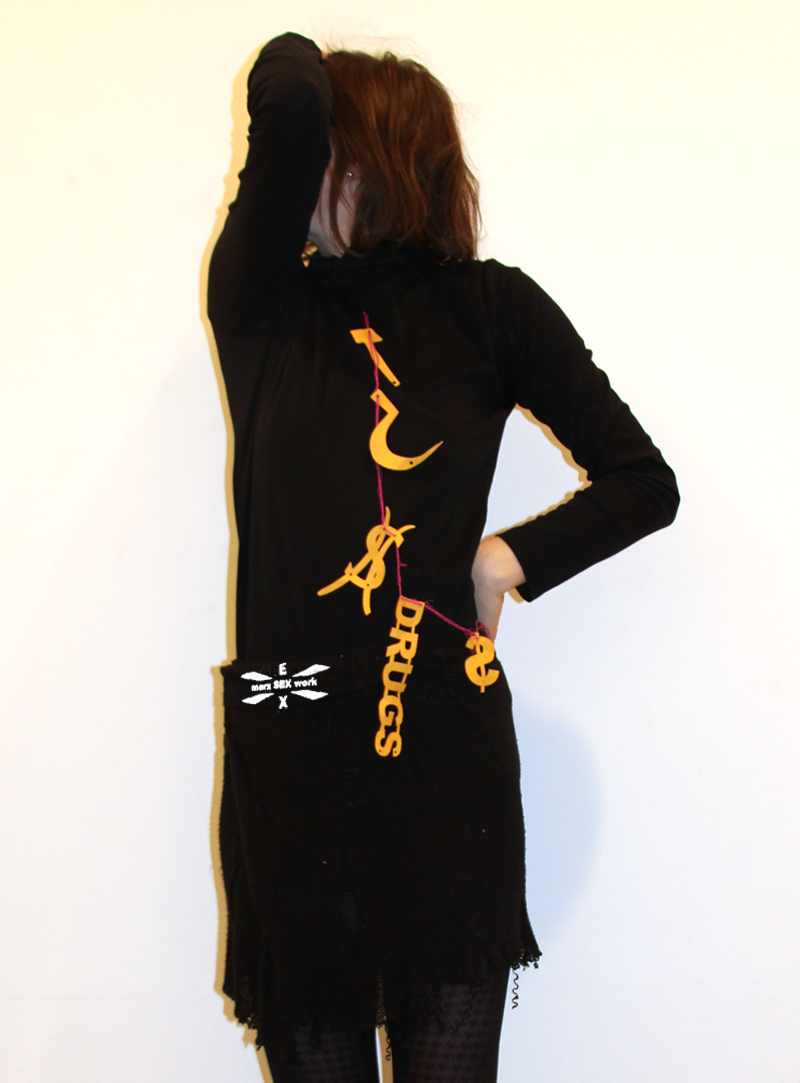
Sex works everywhere. Sex work is a gigantic industry taking on all possible forms with tremendous consequences for sex workers. It is linked to the brutal world of drugs, human trafficking, organized crime, and money laundering as well as the vast worlds of poverty, abuse, addiction, and mental stress. It is more or less an uncontrolled economic sphere where shadow capitalism rules in its most brutal way including real human slavery, child work and blatant abuse of drugs, coercion and violence. Hence it is definitely something that deserves analytical reflecting. Sex as such, with or without much affection, is the most intense form of human interaction that can result in procreation and the spread of diseases. Sex and desires are powerful tools and forces that are not so easy to control originating in multiple cultural, biological and social strata. Hence, sex work is not much less complex and is derivative of our social psycho-economy mirroring partially our interactive economies.
For this series, I worked with silicon, felt and PVC letterings and stuff that oscillates between fetish and meaning. All these accessories could be applied to simple fabrics or pieces of fabrics on the body or even be placed directly on skin. The larger PVC letters spelling out the words DRUGS, MONEY, TRAFFIC, etc. were hastily applied on some rather colorful knit works. Some of the laser cut felt letterings and logos were displayed together directly on the drawings of string based dressing ideas that would have been difficult to present without becoming complicit in catering to a scopic regime that rules sex work. One shouldn’t forget that displaying this series is difficult without playing right into the old scheme of human, mostly female objectification and representational exploitation.